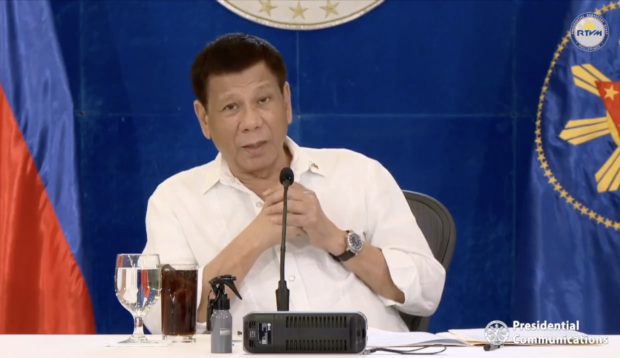For the record: Duterte leaves legacy of impunity – CHR

President Rodrigo Duterte during a “Talk to the People” weekly briefing. (Photo from a PCOO video on Facebook)
MANILA, Philippines — President Rodrigo Duterte will leave a government that has “failed in its obligations to protect human rights” and that has “encouraged a culture of impunity” by stonewalling on independent inquiries and not bringing to trial cops implicated in wrongdoing in his six-year war on drugs, according to a report by the Commission on Human Rights (CHR).
The 48-page report, completed in April and released this week, is one of the final acts by the CHR commissioners whose seven-year terms all expired on May 5. It is an expanded version of a report published in the Inquirer last March, in which the CHR en banc found that police used “excess, unreasonable” force and showed clear “intent to kill” during anti-drug operations.
For this report, the CHR presented 882 drug-related cases involving 1,139 victims, the investigation of which had been concluded. The number represents 23 percent of all drug-related killings examined by the commission from 2016 to 2021.
Shots to the head
The CHR again found that police had used “excessive and disproportionate force” in most of the cases, contrary to their standard claims of self-defense. Of 511 victims alleged to have resisted arrest (“nanlaban”), the CHR found that 73 percent were killed by gunshots to the head and torso, as well as multiple gunshot wounds.
These “indicated intent to kill by the police operatives and disproportionality of force used to repel aggression,” the commission said, adding that there were “possible violations of the rights of the drug suspects and lapses in the observance of protocols established by law.”
Interviews with witnesses also revealed “patterns of discrepancies” in buy-bust operations, warrantless arrests and service of court-issued warrants.
In several cases, witnesses said police acted differently from what was claimed in official reports. Per witness accounts, the cops barged into the homes of the targets and took them away, with their corpses found later.
In at least 26 incidents, police reports showed that the victims killed or injured were not the intended targets.
The CHR also noted 248 cases of drug-related incidents outside the context of law enforcement operations (body dumps, killings by men riding tandem on motorcycles). Of these victims, over 54 percent were included in a drug watchlist, and were killed so brazenly and brutally that the CHR noted “possible consistency with the objectives espoused by the government’s antidrug campaign.”
Stonewalling
Despite overwhelming evidence, survivors found it difficult to pursue justice largely because the Duterte administration refused to cooperate with independent probers, the CHR said.
Government agencies were stonewalling not only the families of victims requesting copies of official police records, but the CHR as well. Their subpoenas and requests “were oftentimes refused, denied or ignored by the PNP (Philippine National Police),” the commission said.
The commission also noted that the PNP lacked police reports on at least 297 of 798 drug-related incidents. CHR field officers often received verbal or written denials or told that their requests needed clearance from higher authorities.
Often, police cited Mr. Duterte’s Sept. 8, 2017, directive to the PNP and military “not to participate in any investigation into alleged human rights violations committed by its agents without his clearance,” the CHR said.
They also cited the exceptions outlined in Executive Order No. 2, which states that the PNP may deny the CHR access to records.
Per the CHR report, such actions and inactions manifest indifference to the commission’s powers to “investigate all forms of human rights violations,” as well as its authority to “request the assistance of any department, bureau, office, or agency in the performance of its functions.”
Moreover, in the 239 incidents involving law enforcers investigated by the PNP, the commission recorded only administrative proceedings against them in only 50 incidents. These investigations, the CHR noted, were conducted “by members of the same station or unit.”
“The impartiality and independence of such investigations have been questioned on various occasions. Seldom did the available investigation reports from the station question the legitimacy of the operations, the use of force and firearms, and the self-defense narrative,” the CHR said.
Recommendations
Overall, the CHR report paints a grim picture of the Duterte administration’s legacy and what awaits presumptive President Ferdinand Marcos Jr.
To improve the human rights situation, the commission listed recommendations for the Office of the President (OP), PNP, Department of the Interior and Local Government, Department of Justice, and Office of the Ombudsman, as well as local and international civil society organizations.
Among the recommendations was for the OP to revise or remove the exceptions used as the basis to deny the commission access to documents.
“With the support of presidential directive and other issuances, the PNP’s repeated denial of the commission’s access to police records is indicative of the lack of transparency and impartiality in its internal processes,” the CHR said.
It requested the PNP’s Internal Affairs Service, Department of Justice, and Office of the Ombudsman to conduct a full, immediate, and impartial investigation of erring cops and to file appropriate charges.
It also asked the same agencies to release the results of their own inquiries into the drug-related deaths and to provide the CHR copies of the reports.
RELATED STORIES
Duterte’s greatest legacy: Prioritizing Filipinos’ interests — Palace
Duterte’s final Sona: A ‘legacy of change’
‘Impunity will be the legacy of Duterte,’ says rights advocates